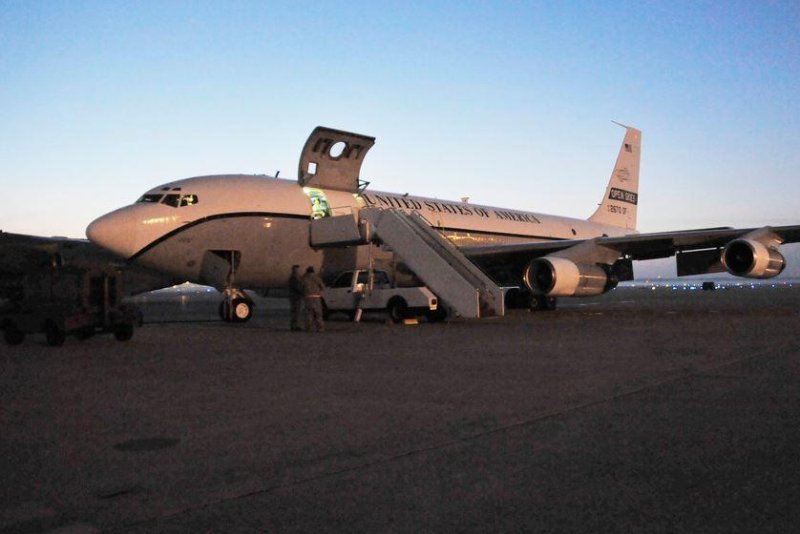The United States uses satellite imaging and two OC-135B surveillance planes in the Open Skies Treaty program. Congressional Democrats voiced concern this week over the potential departure of the United States from the treaty. Photo by A1C Perry Aston/U.S. Air Force
Oct. 9 (UPI) -- Democrats in Congress expressed concern that the United States will withdraw from the 1992 Open Skies Treaty, which allows mutual unarmed surveillance flights over foreign countries.
In a letter to White House national security advisor Robert O'Brien this week, Rep. Eliot Engel, D-N.Y., chair of the House Foreign Affairs Committee, said he was "deeply concerned" by reports that President Donald Trump is considering withdrawal from the treaty.
Similarly, a letter to Defense Secretary Mark Esper and Secretary of State Mike Pompeo from Senate Foreign Relations Committee member Bob Menendez, D-N.J., also signed by House Armed Services Committee Chairman Rep. Adam Smith, D-Wash., House Foreign Affairs Committee Chairman Rep. Eliot Engel, D-N.Y., and Senate Armed Services Committee member Jack Reed, D-R.I., called withdrawal from the treaty "another gift" to Russian President Vladimir Putin.
Reports that Trump will soon announce a U.S. exit from the treaty, on the advice of the National Security Council, surfaced earlier this week. The treaty was signed in 1992 and went into effect in 2002.
Open Skies allows 34 signatory states to conduct unarmed surveillance flights over each other's territory. Withdrawal from the deal would be the latest in the administration's efforts to remove the United States from multilateral agreements and organizations that have helped govern the world since World War II.
The treaty is used in part to help verify arms control agreements, and would affect the American military's ability to conduct aerial surveillance of Russia and other member countries.
While Open Skies is a legacy of the Cold War, it was first proposed by President Dwight Eisenhower and rejected by the Soviet Union -- but established during the George H. W. Bush administration. It offers all signatories, regardless of size, a role in gathering information about military forces and is regarded as a wide-ranging international effort to promote military transparency through "mutual aerial observation."
In August, the United States withdrew from the Intermediate-Range Nuclear Forces Treaty with Russia, which limited the development of short-range ground-based missiles.
"Not only is there no case for withdrawal on the grounds of national security, there has been no consultation with the Congress or with our allies about this consequential decision. Any action by this administration to withdraw from critical international treaties without the approval of the Senate is deeply concerning," Mendendez said in his letter.
The Russian Embassy in Washington similarly voiced support for the treaty on Tuesday.
Pentagon spokeswoman Lt. Col. Carla Gleason noted that Russia has been observed in violation of the treaty in the past but added, "The Open Skies Treaty enhances confidence and security by providing a mechanism for mutual understanding. The United States has imposed treaty-compliant measures on Russian Open Skies flights over the United States in response to their violations. We will continue to work with our partners to press Russia to correct these violations and return to compliance with the treaty."
Sen. Tom Cotton, R-Ark., is among Republican legislators who have long been critical of Russia's violations of the treaty. He noted that it restricts flights over Kaliningrad, a Russian enclave in Europe not adjacent to Russia and the site of a Russian military base.
"Vladimir Putin has violated the Open Skies Treaty for years while continuing to benefit from surveillance flights over the United States," Cotton said on Tuesday. "The president should withdraw from the Open Skies treaty and redeploy the hundreds of millions of dollars the Pentagon wastes on the flights and equipment to increase U.S. combat power."















